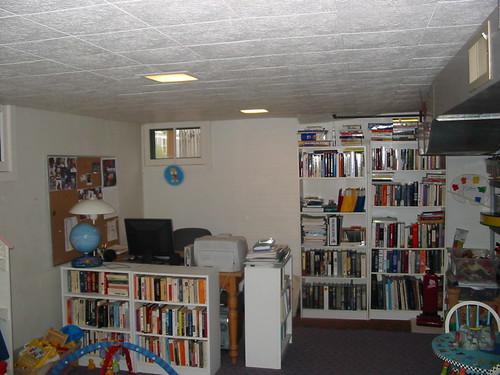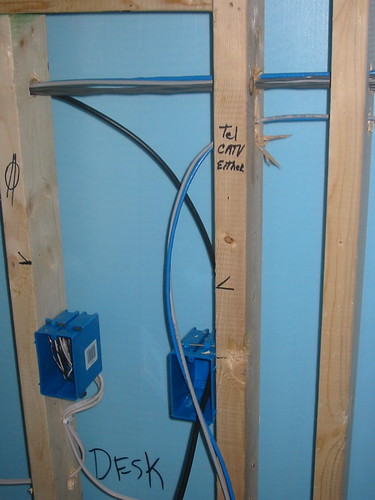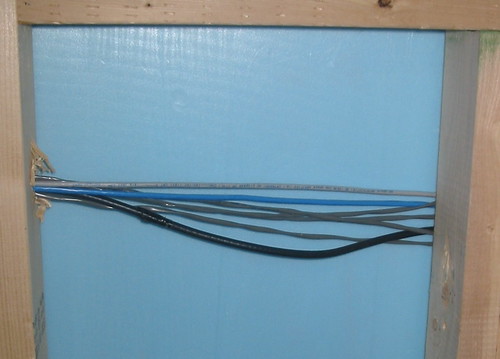Wednesday, April 11, 2007
Home Re-destruction Diary
by Tom Bozzo
"Mr. Blandings," by the way, is the greatest housing economics movie ever made. Blandings (Cary Grant [*]) is a Manhattan ad executive who makes around $15,000 a year — lots for 1948 — and shoulder room is tight in the apartment he shares with his wife, two daughters, and their cook/maid. He gets the idea of joining the nascent postwar exodus to Connecticut suburbia, and hijinks [**] ensue as he's rooked into spending (against the advice of attorney Melvyn Douglas) roughly $30,000 on what turns out to be a large center-hall Colonial and the 30 acres of land more-or-less in the "sticks" (which are not so sticksy that there isn't a train to the city) on which the house is located. Suggested lesson: Distrust conventional wisdom regarding the housing market.
Anyway, for family members, friends, and/or the voyeuristic, some rough-stage construction pix are below the e-fold.
Here's how we took posession of the basement. Painted foundation walls, cheesy ceiling tiles, totally inadequate overhead light fixtures. The stuff belongs to our predecessors — add bookcases, TtFTE, and lots of LEGO and subtract furniture for our decor.

Reverse angle. Power and telecom was sent to their computer via cords run under the rug.

Future built-in work area. Power and comms are conveniently at counter height.

Seven wires for phone, data, TV, and audio. Power sold separately.

Duct relocation (compare second photo) cost a surprising fortune, but no more bonking my head.

The new, super-efficient, super-quite tankless hot water heater that will supply portions of the house with hydronic radiant heat, plus replace an older domestic hot water heater. Eligible for the federal energy efficiency income tax credit! (We'll take such discounts as are available.)

The brains of the new hydronic system.

Water heater deathmatch! The old unit (left) is advertised as consuming 30% more fuel than the tankless heater. The indirect unit (right) is basically a huge, really well-insulated thermos bottle.

All done!
[*] While Fred Thompson's just-disclosed health problems may rule him out of the Republican presidential nomination race, the slightest Grant-ward thought should make pundits who had been swooning over Thompson's movie star appearance seem extra foolish.
[**] Relationship-threatening disputes over finishes, etc.
While the new-house market is imploding, we've been doing our bit to prop up residential investment down in the basement. So far, Mr. Blandings Builds His Dream House moments have been relatively few. Indeed, the only asbestos-containing material we came across was the stuff we already knew about, which is not bad for a 77-year-old house that's seen renovations of widely varying quality — though there are still finishes to pick out.
"Mr. Blandings," by the way, is the greatest housing economics movie ever made. Blandings (Cary Grant [*]) is a Manhattan ad executive who makes around $15,000 a year — lots for 1948 — and shoulder room is tight in the apartment he shares with his wife, two daughters, and their cook/maid. He gets the idea of joining the nascent postwar exodus to Connecticut suburbia, and hijinks [**] ensue as he's rooked into spending (against the advice of attorney Melvyn Douglas) roughly $30,000 on what turns out to be a large center-hall Colonial and the 30 acres of land more-or-less in the "sticks" (which are not so sticksy that there isn't a train to the city) on which the house is located. Suggested lesson: Distrust conventional wisdom regarding the housing market.
Anyway, for family members, friends, and/or the voyeuristic, some rough-stage construction pix are below the e-fold.
Here's how we took posession of the basement. Painted foundation walls, cheesy ceiling tiles, totally inadequate overhead light fixtures. The stuff belongs to our predecessors — add bookcases, TtFTE, and lots of LEGO and subtract furniture for our decor.

Reverse angle. Power and telecom was sent to their computer via cords run under the rug.

Future built-in work area. Power and comms are conveniently at counter height.

Seven wires for phone, data, TV, and audio. Power sold separately.

Duct relocation (compare second photo) cost a surprising fortune, but no more bonking my head.

The new, super-efficient, super-quite tankless hot water heater that will supply portions of the house with hydronic radiant heat, plus replace an older domestic hot water heater. Eligible for the federal energy efficiency income tax credit! (We'll take such discounts as are available.)

The brains of the new hydronic system.

Water heater deathmatch! The old unit (left) is advertised as consuming 30% more fuel than the tankless heater. The indirect unit (right) is basically a huge, really well-insulated thermos bottle.

All done!
[*] While Fred Thompson's just-disclosed health problems may rule him out of the Republican presidential nomination race, the slightest Grant-ward thought should make pundits who had been swooning over Thompson's movie star appearance seem extra foolish.
[**] Relationship-threatening disputes over finishes, etc.
Labels: Housing Bubble, The All-New This Old House
Comments:
<< Home
I see three zone pumps; very sweet. Enjoy them. I've three also, but much bigger and older.
("Mr. Blandings" is one of my favorites.)
Barry Orton
("Mr. Blandings" is one of my favorites.)
Barry Orton
I love "Mr. Blandings," too. Though my favorite quote is the daughter who listens to Grant and Loy and says only, "Bicker, bicker, bicker."
"Mr. Blandings" is one of my great TCM discoveries. (Yes, I am a prole.)
Seven wires? You need FiOS (even if it does have a MSFT OS).
Seven wires? You need FiOS (even if it does have a MSFT OS).
Barry: We'll be using two of the pumps now. The third is a bullet we've bitten so that when we do the next expansion (in the early concept stages now) we can just lay down the PEX tubing and be done w/ it.
PS: Fortunately, we haven't heard that from John or Julia yet. (Not that the project has been bicker-free.) The main thing out of the kids were declarations of not being scared of the construction noises.
Ken: We're in "the new" AT&T's territory, and AFAIK they aren't doing FITL (though Barry is the expert there). But we actually have made provision for future tech -- there's a conduit you can see in the picture with the circular saw. Plus, the future location of the ethernet switch is relatively accessible.
Post a Comment
PS: Fortunately, we haven't heard that from John or Julia yet. (Not that the project has been bicker-free.) The main thing out of the kids were declarations of not being scared of the construction noises.
Ken: We're in "the new" AT&T's territory, and AFAIK they aren't doing FITL (though Barry is the expert there). But we actually have made provision for future tech -- there's a conduit you can see in the picture with the circular saw. Plus, the future location of the ethernet switch is relatively accessible.
<< Home


